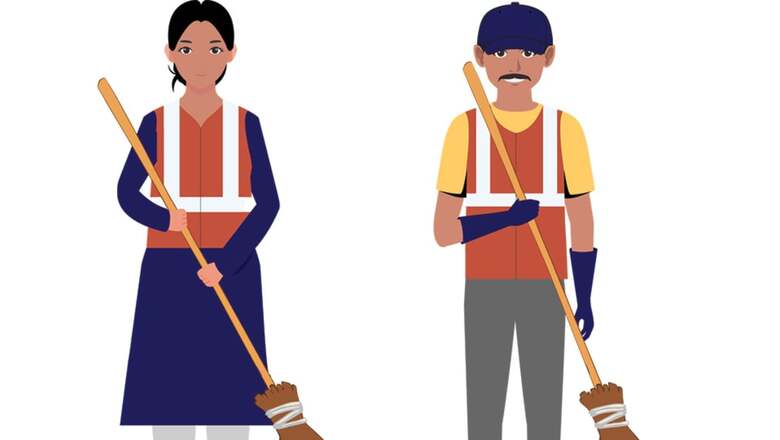
views
In the last few years, we have seen firsthand how India has become cleaner, and more sanitary. Toilets are everywhere, and for the most part, they are clean and well-maintained. Most of us can’t even remember the last time we saw someone relieving themselves on the road – once a common sight even in our cities. Something has changed in our national consciousness when it comes to sanitation and toilet hygiene.
At the frontline of this change are the real unsung heroes: our sanitation workers. These are the people who clean our streets, drains, sewers, toilets, and garbage dumps. They also prevent the spread of diseases and infections that can pose serious threats to our health and well-being. They maintain our toilets, and often even serve as champions of change in their own communities and the communities they serve, by educating people about correct toilet use.
However, despite their essential role, sanitation workers in India face many challenges and hardships that undermine their dignity and rights. Not only are they often exposed to various occupational hazards and health risks that endanger their lives and livelihoods, they may also be called upon to handle hazardous waste without proper protective gear, such as gloves, masks, boots, or suits. This exposes them to infections, injuries, burns, skin diseases, respiratory problems, and even death. It is estimated that three sanitation workers die every five days in India. Tragic, considering that without them, we would all be swimming in diseases like cholera, dysentery and diarrhoea.
Sanitation workers also face social stigma and discrimination based on their caste and occupation. Most of them belong to marginalised communities which have historically been oppressed and exploited by the dominant castes. They are often treated as “untouchables” and denied access to basic amenities, such as water, electricity, education, health care, and social security. They also face harassment, abuse, violence, and humiliation from the public and authorities. Many of them are forced to work as bonded labourers or under contractual arrangements that violate their labour rights.
The problem here is one of power imbalance. Because sanitation workers lack education, come from underprivileged communities, and face social stigma – they don’t easily trust the legal recourse available to them. However, the legal framework exists.
Legal Protections for Sanitation Workers
There are several laws and regulations that aim to protect the rights and welfare of sanitation workers in India. Some of these include:
The Prohibition of Employment as Manual Scavengers and their Rehabilitation Act, 2013: This act prohibits the employment of anyone as a manual scavenger as well as the construction or maintenance of dry latrines. It also provides for the identification, rehabilitation, and compensation of manual scavengers and their families.
The Scheduled Castes and Scheduled Tribes (Prevention of Atrocities) Act, 1989: This act criminalises any act of discrimination, violence, or atrocities against members of the Scheduled Castes (SCs) and Scheduled Tribes (STs), which include most sanitation workers.
The Minimum Wages Act, 1948: This act sets the minimum wages for different categories of workers in different sectors and regions. It also provides for the payment of overtime wages, timely payment of wages, and penalties for non-payment or delayed payment.
The Contract Labour (Regulation and Abolition) Act, 1970: This act regulates the employment of contract labourers in certain establishments and industries. It also provides for the registration of contractors and establishments, welfare measures for contract labourers, such as canteens, restrooms, first aid facilities, etc., and dispute resolution mechanisms.
There are also numerous guidelines and standards for workplace safety that apply to sanitation workers. For instance, international and national norms for sanitation work require independent monitoring and inspection of sanitation work by competent authorities. They also require that sanitation workers have access to and use proper protective gear, such as gloves, masks, boots, or suits, when handling hazardous waste. They should also have access to and use other safety equipment, such as ropes, ladders, buckets, or machines, when working in confined spaces, such as sewers or drains.
The problem, once again, is a lack of awareness amongst sanitation workers, of these norms and rights.
Harpic World Toilet College: Setting New Standards
Harpic, as India’s leading brand in the lavatory care segment, has a deep and nuanced understanding of the specific challenges that sanitation workers face, and it decided to put this understanding to good use, when it established the Harpic World Toilet College (HWTC) in 2016.
HWTC was established with the stated objective of improving the quality of life of sanitation workers through their rehabilitation by linking them with dignified livelihood options. Workers trained by the college are provided placement with various organisations. Following the successful proof of concept in Rishikesh, HWTCs have opened in Maharashtra, Aurangabad, in partnership with Harpic, Jagran Pehel and Maharashtra Government.
There are specific ways in which HWTC uplifts and empowers sanitation workers. It has a holistic training approach that addresses not only technical skills but also personal development, health, and safety. Participants learn about environmental cleanliness, water-related issues, and different sanitation practices. Once they learn about the health hazards inherent in their jobs, most sanitation workers opt in for safety gear.
The college also helps sanitation workers work towards economic independence by helping them find employment in the organised sector. These jobs often come with benefits like Provident Fund and Employee State Insurance, which provide economic stability to these workers and their families. They are no longer solely dependent on irregular daily wages but have access to financial security.
The Winds of Change
Harpic’s creation of World Toilet Colleges uplifts the entire profession – no longer is it seen as unskilled, dirty work. It is now seen as a profession that requires specific skills and training; and sanitation workers are seen as trained, skilled professionals performing essential services.
Three years ago, Harpic joined hands with News18 to create Mission Swachhta aur Paani, a movement that champions the cause of inclusive sanitation, equality for all genders, abilities, castes and classes and the strong belief that clean toilets are a shared responsibility.
Mission Swachhta aur Paani creates the space for dialogue on key issues regarding toilet access and toilet hygiene, and the problems that sanitation workers face. These discussions involve government officials, NGOs, activists, sanitation workers, educators and members of the public. The aim is to come up with informed solutions to nuanced problems, and raise the awareness of the general public about the problems we contribute to, and how we can reverse that trend.
Join us here, to learn about how you can be a part of the solution.




















Comments
0 comment